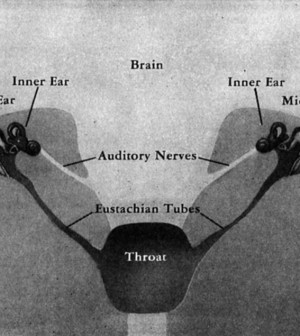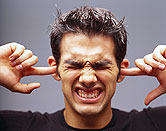- 7 Best Breads for Maintaining Stable Blood Sugar
- Gelatin vs. Collagen: Which is Best for Skin, Nails, and Joints?
- The Long-Term Effects of Daily Turmeric Supplements on Liver Health
- Could Your Grocery Store Meat Be Causing Recurring UTIs?
- Are You Making This Expensive Thermostat Error This Winter?
- Recognizing the Signs of Hypothyroidism
- 10 Strategies to Overcome Insomnia
- Could Artificial Sweeteners Be Aging the Brain Faster?
- Techniques for Soothing Your Nervous System
- Does the Water in Your House Smell Funny? Here’s Why
Magnetic Pulses to Brain May Ease Ringing in the Ears


Magnetic pulses to the brain may provide lasting relief to many people with tinnitus, new research suggests.
The nearly 45 million Americans with tinnitus hear a persistent ringing, buzzing, hissing or other sound even when there is no external sound source. Tinnitus can interfere with people’s ability to sleep or concentrate, and it is sometimes disabling, the study authors explained.
Currently, there are no proven treatments for tinnitus, the researchers said.
The new study included dozens of patients who’d had tinnitus for at least a year and underwent “transcranial magnetic stimulation” sessions on 10 consecutive workdays, receiving 2,000 magnetic pulses per session.
Tinnitus symptoms were eased for at least six months in half of the patients who received the active treatment versus a “sham” treatment, according to the study published July 16 in the journal JAMA Otolaryngology – Head & Neck Surgery.
“For some study participants, this was the first time in years that they experienced any relief in symptoms. These promising results bring us closer to developing a long-sought treatment for this condition that affects an enormous number of Americans, including many men and women who have served in our armed forces,” Robert Folmer, an associate professor of otolaryngology/head and neck surgery at Oregon Health & Science University, said in a university news release.
Folmer is also a research investigator with the National Center for Rehabilitative Auditory Research at the VA Portland Health Care System.
“The results of the joint National Center for Rehabilitative Auditory Research/OHSU study are promising for tinnitus patients everywhere,” said Melanie West, chair of the board of directors at the American Tinnitus Association.
Military veterans are at increased risk for tinnitus and it is the most common service-related disability in the VA health system, the researchers said.
Currently, the only approved use of transcranial magnetic stimulation in the United States is for treating depression.
More information
The U.S. National Institute on Deafness and Other Communication Disorders has more about tinnitus.
Source: HealthDay
Copyright © 2026 HealthDay. All rights reserved.










